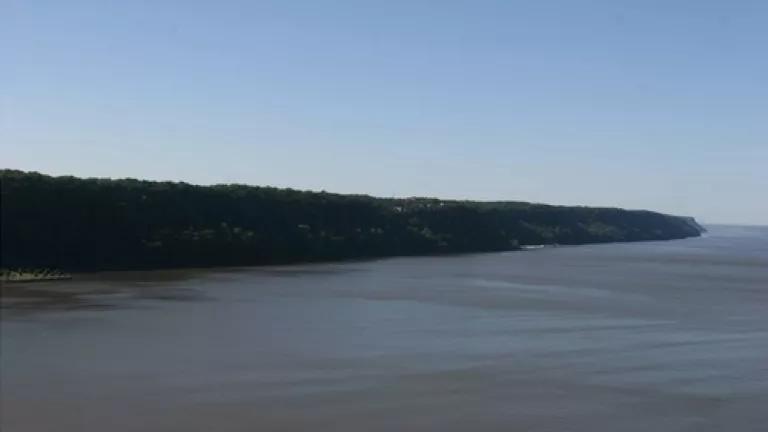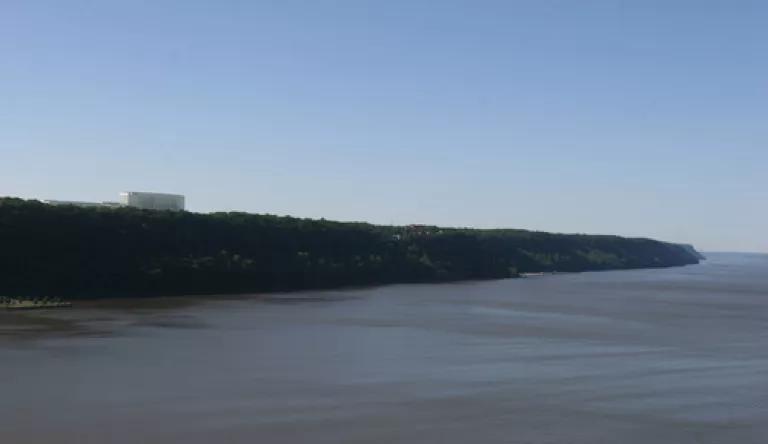
In a lawsuit that could determine the fate of one of our country's great natural and historic landmarks—the Palisades Interstate Park along the Hudson River—NRDC and the New Jersey Conservation Foundation are today moving to join a lawsuit against LG Electronics over its plan to build an office tower that would rise high above the park, permanently spoiling the unbroken Palisades sweeping northwards from the George Washington Bridge.
The Palisades Interstate Park is a pristine area of land along the west bank of the Hudson River running through northeastern New Jersey and Southern New York. The cliffs and ridge tops of the Palisades to the north of the bridge are unbroken for 16 miles.
In addition to their regional significance, the Palisades are also important nationally. The Palisades have the rare distinction of being designated a National Natural Landmark as well as being listed on the National Register of Historic Places. And they were recently added to the World Monument Fund’s 2014 “World Monuments Watch” list.
As the New York Times reports today, the suit that NRDC seeks to join as an intervener challenges the South Korean company’s plan to build a 143-foot tower on the crest of the Palisades cliffs north of the bridge. By rising 90 feet above the tree line, the proposed building would spoil parkland and vistas enjoyed by millions from parks, parkways, pathways and bridges on both sides of the Hudson River.

Simulated view from the George Washington Bridge (Technical rendering: Saratoga Associates)
NRDC and NJCF are seeking to join residents of Englewood Cliffs, NJ, the New Jersey Women’s Federation and Scenic Hudson as plaintiffs in the case. The suit challenges the legality of a zoning variance that would allow LG to build a tower next to the Palisades Interstate Park that would be more than four times taller than the historic zoning limit respected by all other builders.
For more than a year, NRDC, NJCF and a coalition of 25 groups have been urging LG to redesign its headquarters at a lower height to protect the Palisades, its parkland and vistas. That goal has also been advocated by four former governors of New Jersey, editorial boards in both New Jersey and New York, leading cultural and civic institutions and elected officials. The U.S. Environmental Protection Agency and the National Park Service have also spoken out against LG’s plan—something the federal government rarely does in these types of environmental disputes.
NRDC has a four-decade history of advocating for the protection of our national parks and public lands, including leading campaigns to create 100 million acres of national parks and wildlife refuges in Alaska, and engaging in the defense of Yellowstone, the Grand Canyon, and the Everglades.
Here in the New York-New Jersey region, we have also been involved since our founding in 1970 with the protection of the Hudson River and the region’s natural resources – including the Palisades. NRDC has litigated to help protect the Hudson River and its shoreline from the construction of ill-advised power plant projects, including the famed Storm King Mountain proposal. NRDC has also worked to create and defend local parkland. Successful NRDC litigation in the 1970s, for example, helped expand the size of the newly created federal Gateway National Recreation Area, which provides important recreational space for urban residents and now covers more than 26,000 acres in New York and New Jersey.
NRDC seeks to join the Palisades zoning litigation to represent a nationwide interest in this important American treasure.
As my colleague Robert F. Kennedy, Jr. eloquently told the New York Times today: “It is so important to maintain landscapes in cities, so people who can’t afford to go out to the national parks will be able to experience the majestic beauty of the American wilderness in their backyard.”

